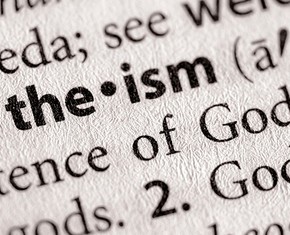The views expressed in our content reflect individual perspectives and do not represent the authoritative views of the Baha'i Faith.
Our religious institutions have far too often become handmaidens of the status quo, while the genuine religious experience is anything but that. True religion is by nature disruptive of what has been, giving birth to the eternally new. – Marianne Williamson
As I see it the world is undoubtedly in need of a new religion, and that religion must be founded on humanist principles. When I say religion, I do not mean merely a theology involving belief in a supernatural god or gods; nor do I mean merely a system of ethics, however exalted; nor only scientific knowledge, however extensive; nor just a practical social morality, however admirable or efficient. I mean an organized system of ideas and emotions which relate man to his destiny, beyond and above the practical affairs of every day, transcending the present and the existing systems of law and social structure. The prerequisite today is that any such religion shall appeal potentially to all mankind; and that its intellectual and rational sides shall not be incompatible with scientific knowledge but on the contrary based on it. – Julian Huxley
This re-formation and renewal of the fundamental reality of religion constitute the true and outworking spirit of modernism, the unmistakable light of the world, the manifest effulgence of the Word of God, the divine remedy for all human ailment and the bounty of eternal life to all mankind. – Abdu’l-Baha, Foundations of World Unity, p. 10.
Is religion renewable? Can an old Faith recapture its original essence, its initial spiritual purity? If modern human beings need a modern belief system, can we recycle, revitalize and renew the religions of old?

Martin Luther
The religion my parents raised me in—Lutheranism—arose out of those exact questions. Martin Luther, the German friar who opposed the practices of the Catholic Church, tried to reform Christianity during the 16th Century. He did it with his famous Ninety-Five Theses, which challenged the Church’s selling of indulgences and several other corrupt practices, and wound up permanently dividing Christianity.
Have you ever heard of an indulgence? During Luther’s time, many Catholics actually sold pardons from sin, called indulgences. Luther hated the practice, convinced that money had corrupted the Church and resulted in the abandonment of Christ’s original teachings. Luther challenged the Pope, who he publicly called the Antichrist, and rejected many of the dominant church’s practices. Supposedly, Luther nailed his critical Ninety-Five Theses document to the door of All Saints Church in Wittenburg, Saxony in 1517. Within five years, Protestantism had begun to replace Catholicism all over Europe, and Christianity underwent its most serious schism. All over Europe in the 1500’s, people attacked Catholic churches and burned their idols and icons, their violent actions known as the iconoclastic riots. For his troubles, the Church excommunicated Martin Luther and had the emperor label him an outlaw, making it a crime to give him food or shelter, and authorizing anyone to kill him.
Did Luther’s actions reform Christianity? Not really, scholars say. Instead, Luther succeeded in splitting the Christian Faith into many sects, causing wars and revolts, and bringing about a heightened hatred of Jews and Muslims, who Luther reviled and attacked in books he wrote, especially his screed titled On the Jews and Their Lies. Some even blame the origins of Nazism on Luther’s virulent anti-Semitism.
Luther’s process of reformation, however, assisted enormously by the invention of the printing press, eventually resulted in almost a billion Protestants in today’s world.
Most people would probably conclude, after studying Luther’s impact on religion, that reforming an existing Faith is a daunting task, impossible to do without creating enormous conflict and pain.
Baha’is believe religion not only can but must be renewed. However—from a Baha’i perspective, that process doesn’t happen with just a reform-minded individual bent on revitalizing the fortunes of an existing Faith. Instead, in the organic cycle of religious dispensations, the appearance of a new messenger of God, a new prophet, always heralds the true rebirth of religion:
The religion of God is one religion, but it must ever be renewed. Moses, for example, was sent forth to man and He established a Law, and the Children of Israel, through that Mosaic Law, were delivered out of their ignorance and came into the light; they were lifted up from their abjectness and attained to a glory that fadeth not. Still, as the long years wore on, that radiance passed by, that splendour set, that bright day turned to night; and once that night grew triply dark, the star of the Messiah dawned, so that again a glory lit the world.
Our meaning is this: the religion of God is one, and it is the educator of humankind, but still, it needs must be made new. When thou dost plant a tree, its height increaseth day by day. It putteth forth blossoms and leaves and luscious fruits. But after a long time, it doth grow old, yielding no fruitage any more. Then doth the Husbandman of Truth take up the seed from that same tree, and plant it in a pure soil; and lo, there standeth the first tree, even as it was before.
Note thou carefully that in this world of being, all things must ever be made new. Look at the material world about thee, see how it hath now been renewed. The thoughts have changed, the ways of life have been revised, the sciences and arts show a new vigour, discoveries and inventions are new, perceptions are new. How then could such a vital power as religion — the guarantor of mankind’s great advances, the very means of attaining everlasting life, the fosterer of infinite excellence, the light of both worlds — not be made new? This would be incompatible with the grace and loving-kindness of the Lord. – Abdu’l-Baha, Selections from the Writings of Abdu’l-Baha, pp. 52-53.
















Comments
Sign in or create an account
Continue with Googleor